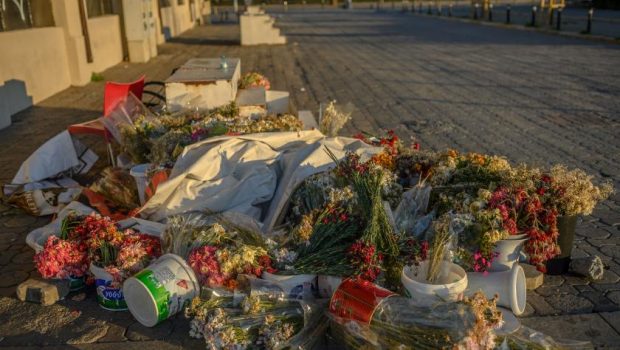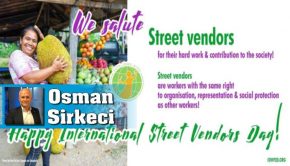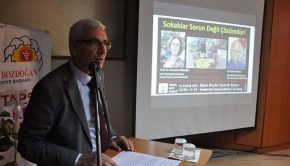As the world stays home, street vendors fight to survive
By Jennifer Hattam: “Street vendors work to earn money for the next day, not for the day after that. But these days, they can’t go out to the streets, and if they do, they can’t find any customers there,” says Dr. Osman Sirkeci
On a typical day, Istanbul’s streets hum with the sounds of small-scale commerce: vendors with trays of bread rings balanced on their heads, or pushcarts piled high with seasonal fruits and vegetables, calling out their wares to passers-by as they weave through the city’s crowds. Since the coronavirus pandemic hit Turkey in mid-March, however, those once-vibrant streets have largely gone silent, leaving the people who form an essential part of the urban fabric in a precarious position.
“Street vendors work to earn money for the next day, not for the day after that. But these days, they can’t go out to the streets, and if they do, they can’t find any customers there,” says Dr. Osman Sirkeci, the head of a recently established municipal body working on street economy issues in the Turkish city of İzmir. He estimates that only 10% to 15% of street vendors in Turkey are currently able to make even a minimal living.
Around the world, street vendors are among the most vulnerable to the ongoing economic turmoil wrought by the coronavirus — and potentially to the disease itself. Many are part of a two-billion-strong global workforce of the informally employed that is often poor, lacking in job security and health care, unable to “socially distance” by working from home, and unable to access government support. A growing number of initiatives by street vendors and their advocates aim to help these workers recover some of their income while simultaneously bolstering the cities where they operate.
“Street vendors are very important in providing what communities need, whether it’s the halal food carts in Bay Ridge, Brooklyn, or the hundreds of different cuisines in Corona or Jackson Heights [in Queens], that reflect the diversity of the neighbourhood,” says Mohamed Attia, executive director of the Street Vendor Project in New York City. “There’s also a security aspect: street vendors are the eyes and ears for the city, lighting up our sidewalks at night and making them feel safe”.
The Street Vendor Project has initiated a crowd-funding campaign to provide small emergency relief payments to its 2,000 members, people like Mamdouh Elgammal, a vendor originally from Alexandria, Egypt, who has been operating a halal food cart outside of LaGuardia Community College in Queens for the past 20 years.
“I do well over there, but most of my customers are students, so once the schools closed, there was no one on the streets. I haven’t worked since 5 March,” says Elgammal, who is the sole financial provider for his family of four. “It’s almost at the end of the month, so that’s going to be the second month with no money for rent,” he says. “To be honest, I think I can only last like this for a couple of weeks more. I’ve had customers call me, they say they miss my sandwiches, but they can’t go out right now”.
The Street Vendor Project’s crowd-funding campaign has raised more than $70,000 in under a month, a sign, executive director Attia says, that “New Yorkers look out for each other and understand the value of street vendors to our urban culture”.
The group is also working to get some of New York’s 20,000 street vendors included in municipal contracts to deliver food to people left homebound by the pandemic. A similar effort is underway in the UK, where the Nationwide Caterers Association is connecting food truck operators and other mobile vendors with gigs feeding essential workers, including healthcare staff at the NHS. In Barcelona, members of a migrant street vendors union are being employed by a food bank to deliver groceries to needy families.
Such initiatives highlight one of the most crucial roles street vendors play globally.
“Research unequivocally shows that the informal economy is absolutely critical to food security, particularly in lower-income communities,” says Caroline Skinner, urban research director for Women in Informal Employment: Globalizing & Organizing (WIEGO). Street and market vendors reach areas without supermarkets, offer low-cost alternatives to restaurant meals, often extend credit to regular customers, and sell in smaller, more affordable quantities. And even during a pandemic, Skinner says, “they can trade as safely as supermarkets as long as they have water supplies and sanitizer at hand”.
Many national and local governments have in fact classified mobile food vendors, especially those selling fresh produce and other staples, as essential workers. But they still face an array of obstacles, including drastically reduced foot traffic by potential customers; restrictions on travel between rural areas where food is grown and cities where it is sold; and rising prices for their stock due to hoarding by more well-off consumers.
“Governments don’t really understand how the informal economy functions, even in countries where it makes up 80% to 90% of the workforce,” says Oksana Abboud, international coordinator for StreetNet International, a global alliance of membership-based street vendors’ organizations. “So we are encouraging our members to propose practical, bottom-up solutions, like working in shifts at street markets to ensure that everyone gets at least some very basic income, rather than closing them altogether”.
In the early stages of the pandemic, many vendors were quick to take to the streets with masks and hand sanitizer for sale. In some cities, including Portland, Oregon, and Washington, DC, they are being more formally incorporated into public-health efforts to get coronavirus-related information and supplies into underserved communities.
Elsewhere, street vendors are partnering with local taxi and rickshaw drivers to expand their customer bases by home-delivering meals. Some of these pairings are happening organically. In Bangkok’s Old Town in Thailand, vendors got a boost from employees of the Once Again Hostel, who started the online platform Locall.bkk to promote the street vendors they used to recommend to their now-vanished guests.
“These vendors don’t always know how to work with digital platforms, so this has been a good way to introduce them to more people. The volume of orders has doubled every week since we started,” says Peangploy Jitpiyatham, cofounder of Locall.bkk, which coordinates delivery by underemployed motorcycle drivers of cooked dishes, baked goods, beverages, and snacks made by some 60 different vendors. “We do a lot of work with local social enterprises, so this is not just a pop-up,” Jitpiyatham says. “It’s part of the relationship we have with the community, a tool to help everyone work together”.
Despite their creativity, few of these initiatives can fully make up for street vendors’ lost income, so most advocacy groups are pushing governments to provide some kind of emergency cash support during the pandemic, and to make sure relief programmes are inclusive of all workers, now and in the future.
“Amid the darkness of coronavirus, there are some real opportunities to address the fault lines it has amplified so dramatically,” says Skinner of WIEGO, who emphasizes the importance of governments reaching out to grassroots networks of informal workers like street vendors to incorporate them into social-protection systems and tap their expertise.
That’s just what Dr. Sirkeci has been hired to do in İzmir, Turkey, where he is bringing together – virtually, of course – members of different street vendors’ associations in the city to talk about their daily problems and discuss possible solutions.
“Street vendors are always ready to adapt to a new situation,” he says. “It’s not like a big company that needs many months to change. They are ready every time.”
Jennifer Hattam is a freelance journalist based in Istanbul.
(citymetric.com)





























































